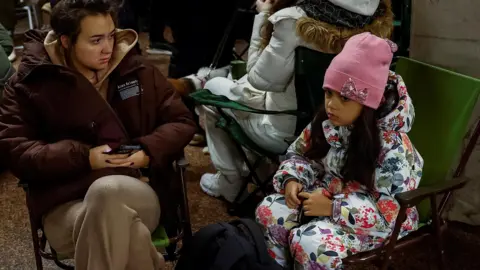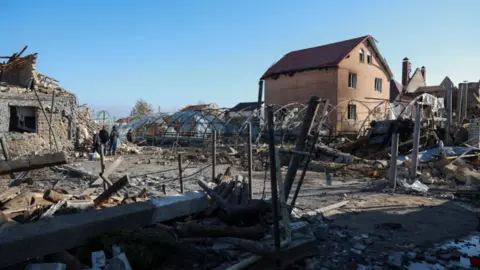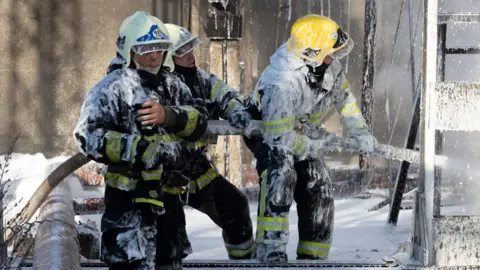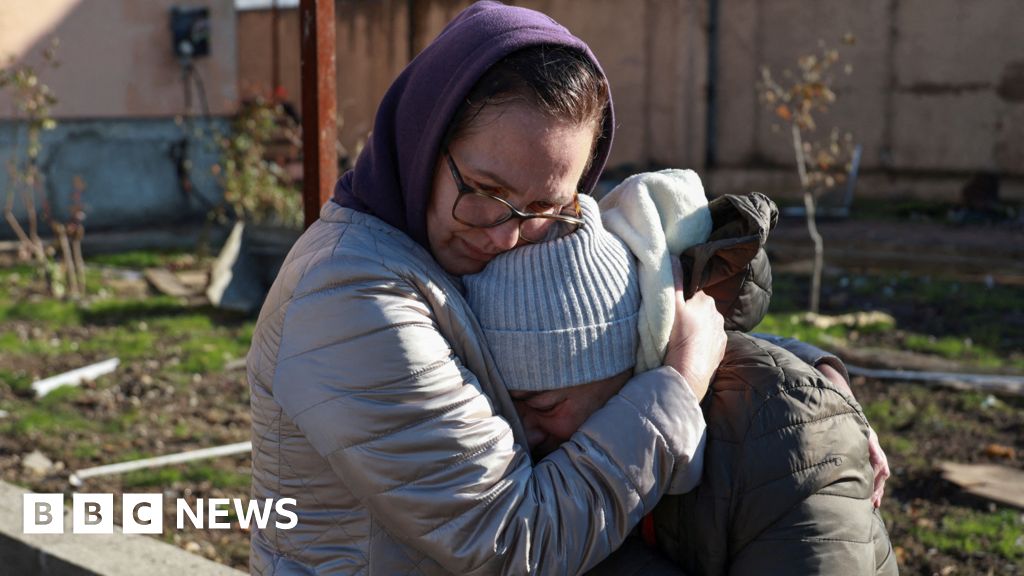 Reuters
ReutersA “massive” Russian missile and drone attack has targeted power infrastructure across Ukraine, the country’s President Volodymyr Zelensky has said.
At least 10 people were killed in the strikes, which hit the capital, Kyiv, as well as multiple targets in several regions including Donetsk, Lviv and Odesa.
Ukraine’s largest private energy company, DTEK, said its thermal energy plants had suffered “significant damage”, resulting in blackouts.
The country’s state-owned energy operator, Ukrenergo, says it will enforce “restriction measures” for the whole of Ukraine on Monday.
The co-ordinated assault overnight on Saturday was largest of its kind since early September, according to authorities and local media.
In total, around 120 missiles and 90 drones were launched, Zelensky said on Telegram.
“Peaceful cities, sleeping civilians” and “critical infrastructure” were targeted, Ukraine’s foreign minister Andrii Sybiha said.
The Russian defence ministry reported that it had hit all its targets, saying that its attack was on “essential energy infrastructure supporting the Ukrainian military-industrial complex”.
“Russian terrorists once again want to scare us with cold and lack of light,” was how President Zelensky put it.
Of course, anything that seeks to deny power to factories producing weaponry inevitably harms civilians too – indirectly, through the loss of electricity and frequently water, and directly, as missiles or fragments of missiles rain down from the sky.
The governor of the Odesa region, Oleh Kiper, said there had also been disruptions to heat and water supplies, although the latter was gradually being restored. Hospitals and other critical infrastructure were operating using generators.
Further east, the city of Mykolaiv was also hit. The region’s leader, Vitaliy Kim, told the BBC that the people were resilient there, despite being attacked regularly.
“People are in a good shape and want to defend themselves. We do not want to lose our homes,” he said.
In Kyiv, fragments from intercepted missiles and drones fell in several places, but there were no reports of injuries.
The attack was the eighth large-scale one targeting Ukraine’s energy facilities this year, DTEK said in a statement, adding that its plants had been attacked more than 190 times since the start of Russia’s full-scale invasion of Ukraine in February 2022.
Ukrainian officials fear the most recent strike could signal another concerted Russian attempt to deplete the power grid as winter arrives.
Having already endured two-and-a-half bitter winters since Russia’s full-scale invasion in February 2022, Ukrainians are bracing themselves for another.
“Here we go again” were the words of an official at one of Ukraine’s private energy companies, summing up the mood across the country on Sunday.
Through ingenuity and sheer determination, Ukraine has managed to survive each winter assault so far. There is every chance it will again, although its generation capacity is now less than a half of what it was in February 2022.
 Reuters
ReutersPoland, Ukraine’s neighbour to the west, scrambled fighter jets to patrol its own airspace as a security precaution.
“Due to a massive attack by Russia, which is carrying out strikes using cruise missiles, ballistic missiles and drones against sites located, among other places, in western Ukraine, operations by Polish and allied aircraft have begun,” Poland’s Operational Command said.
Hungary, which neighbours both Ukraine and Poland, was also on alert after drone attacks struck the westernmost Subcarpathian region – about 20km (12 miles) from the Hungarian border.
The country’s defence minister said the “situation is being monitored continuously”.
 State Emergency Service Of Ukraine
State Emergency Service Of UkraineThese latest attacks come as both Ukraine and Russia continue to try to anticipate how US President-elect Donald Trump will act once his administration takes power in January.
Trump has consistently said his priority is to end the war and what he describes as a drain on US resources in the form of military aid to Kyiv. He has not said how.
The US has been the greatest supplier of arms to Ukraine. Between the start of the war and the end of June 2024, it delivered or committed to send weapons and equipment worth $55.5bn (£41.5bn), according to the Kiel Institute for the World Economy, a German research organisation.
There are fears in Kyiv that it may come under pressure to negotiate an end to the war that may favour Russia’s advances – Moscow continues to control a large swathe of Ukrainian territory.
Zelensky has said he is certain the war with Russia will “end sooner” than it otherwise would have under the new Trump presidency.
Kremlin spokesman Dmitry Peskov recently told Russian state media of “positive” signals from the incoming US administration. But Russia has denied that a phone call took place in which Donald Trump reportedly warned the Russian president against escalating the war.
However, for all the talk of the possible changes coming when Donald Trump enters the White House, Sunday’s attacks seem to indicate that, for now at least, the war’s grim realities are not changing.
Meanwhile, the leader of Germany – another Ukrainian ally – has defended a phone call he had with Putin on Friday, something Kyiv criticised as an attempt at appeasement.
“It was important to tell him [Putin] that he should not count on the support of Germany, Europe and many others in the world for Ukraine waning, but that it is now also up to him to ensure that the war comes to an end,” Olaf Scholz said on Sunday.
He added that the Russian president had given no indication of a shift in his thinking on the war.


